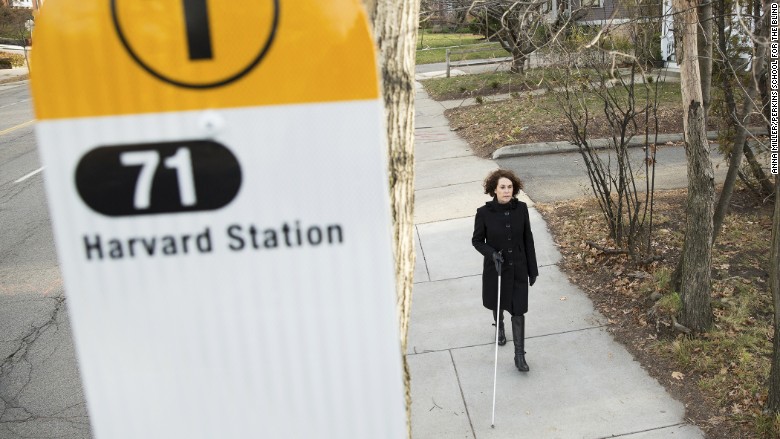
Like many Bostonians, Joann Becker uses her smartphone to find the nearest bus stop. Unfortunately, GPS is only accurate give or take 30-feet, and unlike most people, Becker can't look up to see exactly where the bus is going to stop. Becker is blind.
Her employer, the Perkins School for the Blind, is building an app that crowdsources micro-location information. It's starting with local bus stops but developers think it can eventually help address the "last 30-feet" problem faced by visually impaired commuters all over the world.
Now the Perkins School is getting a little help, and $750,000, from a technology company that knows a thing or two about mapping: Google.
Google.org, the philanthropic arm of Google, is giving out more than $20 million in grants to organizations that are using technology to help people with disabilities. The company announced the 30 winners of its Google Disability Challenge on Tuesday, with an average of $750,000 going to each organization. Google received over a thousand applications from 88 countries after announcing the contest last year.
Related: How Google designs for the blind
"This particular topic was of interest because it was really globally relevant," said Google's Brigitte Hoyer Gosselink, who led the challenge. "One in seven people around the world has a disability."
The final grants will help people with a wide range of disabilities. There are groups 3D printing prosthetics and creating software that helps people with Autism Spectrum Disorders practice job interviews on digital people.
The Center for Discovery is getting $1 million to make indieGo, an open-sourced device that can turn a manual wheelchair into a power wheelchair. Ezer Mizion and Click2Speak are working on an on-screen keyboard that helps people with impaired motor skills type without their hands. Google.org is giving them $400,000.
Not all of the innovations Google is funding are high-tech. Miraclefeet will use its $1 million grant to expand the use of SMS messages to help clubfoot patients keep up with treatments.
Perkins is just one organization helping the visually impaired. As the first school for the blind in the United States, the school has always worked on innovative technology, but this is its first smartphone app.
"We see so much potential for mobile applications to help the blind, it's like a brand new tool to go after the old stubborn problems," said Perkins' president Dave Power. The school is working with Raizlabs, a software development team in Boston.
Related: Google wants to help map Zika outbreaks
The school got the idea after Becker mentioned her bus stop woes. An avid walker, her route can change from day to day, and she often visits new neighborhoods for her job.
"Thirty feet makes all the difference between a bus moving right past me to actually stopping where it ought to," said Becker.
The app is still in the early stages but they hope to have a final version next year. It will ask sighted commuters to share more detailed information about bus stops they visit, such as the exact space where a bench or shelter is located. It will motivate people to contribute information by making it into a game or offering rewards like a discount on coffee.
Google isn't just offering money to these organizations, it's also connecting them with its own experts to consult on the final products. It has a special connection in mind for the Perkins School.
"We at Google actually have a team that does a lot of crowdsourced clues" said Gosselink. "It's called Waze."

